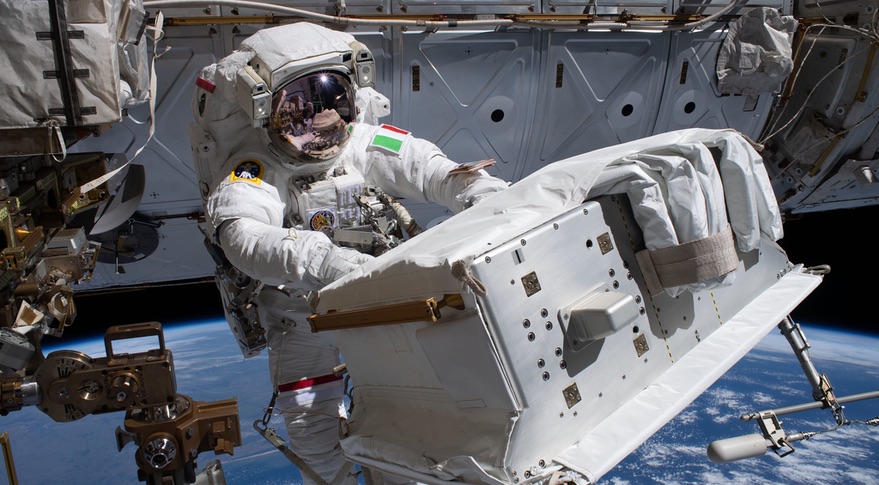Products You May Like
WASHINGTON — NASA space station managers are still trying to find ways to squeeze in at least three spacewalks into a crowded schedule before the station’s crew drops to three people in February.
NASA astronaut Andrew Morgan and ESA astronaut Luca Parmitano completed the third in a series of spacewalks Dec. 2 to repair the Alpha Magnetic Spectrometer (AMS) instrument mounted on the station’s truss. While the two astronauts successfully installed a new coolant pump for the AMS on that spacewalk, one more spacewalk is needed to wrap up the complex repair effort.
NASA, though, hasn’t set a date for that final AMS spacewalk, and a busy schedule of visiting vehicles means it is unlikely to take place this month. “The fourth EVA was something we were going to have to find a home for and we’re still in that position,” said Kenny Todd, NASA ISS operations integration manager, during a Dec. 3 press conference about the upcoming Dragon cargo mission to the station.
That Dragon mission, now scheduled for launch Dec. 5 after winds scrubbed a Dec. 4 launch, is just the first of three spacecraft scheduled to visit the station this month. Russia will launch a Progress cargo spacecraft Dec. 6, docking with the station Dec. 9. Boeing’s CST-100 Starliner is scheduled for a Dec. 19 launch on an uncrewed test flight. If that launch date holds, the Starliner would dock with the station Dec. 20 and remain there four or five days.
That makes it unlikely that final AMS spacewalk will take place this month. “We’ll be looking to do that probably some time after the first of the year, unless between now and then a window opens up,” Todd said.
NASA also has unfinished spacewalking work to replace batteries that are part of the station’s power system. Astronauts performed two battery replacement spacewalks in early October, but halted that work when a battery charge/discharge unit, or BCDU, failed after the second spacewalk. Astronauts Christina Koch and Jessica Meir replaced the unit on a third spacewalk Oct. 18.
Todd said engineers are still investigating why the BCDU failed and how it might be linked to the battery replacement process. “That team is still doing their job and coming up with their version of what might be happening,” he said, along with steps to mitigate any such problems in the future.
He said managers see a window to carry out the remaining spacewalks, for both the battery replacements and the AMS repair, that opens after the Dragon spacecraft departs the ISS in early January. That window would run through about Feb. 6, when Koch, Parmitano and Russian cosmonaut Alexander Skvortsov return to Earth, dropping the crew size to three.
It’s unlikely, Todd said, that NASA would carry out a spacewalk with only a three-person crew except in contingency situations, closing that window. He added later that there may be a brief opportunity to conduct a spacewalk in April, during the “handover” period after the arrival of NASA astronaut Chris Cassidy and Russian cosmonauts Nikolai Tikhonov and Andrei Babkin, bringing the crew back to six for a short time.
Todd said the higher priority is to complete the battery replacements, assuming engineers understand by then what caused the BCDU failure and how to prevent it from happening again. “If we have a window to do three EVAs,” he said, “it would be two battery EVAs and then, if we have time, we can get the third one, which would be an AMS EVA.” He added, though, that it might be more efficient to do the AMS repair spacewalk first, since the spacesuits are already set up for Morgan and Parmitano to use.
If NASA does proceed with the battery replacements, but runs out of time before completing the AMS work, Todd said there is no danger to the instrument if its repair is delayed. The AMS was turned off for the cooling pump replacement but won’t be turned back on until after the final repair spacewalk, and can remain dormant for months.
He said NASA made it clear to the AMS project before the repairs started that there was no commitment to completing the repairs by a specific date. “We were very upfront about the fact that there may be a window in January, there may be a small window in April, but none of those are guarantees at this point,” he said. If that final repair spacewalk doesn’t take place in January or April, he added, “we’re going to have to wait until we get some larger crews on station when we start to see some of the U.S. commercial vehicles coming on for longer stays.”
